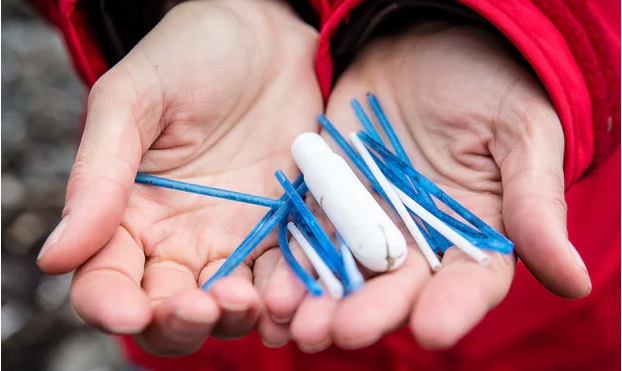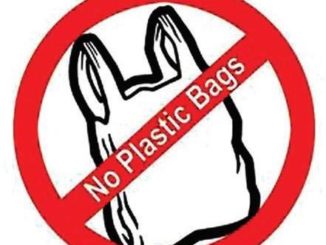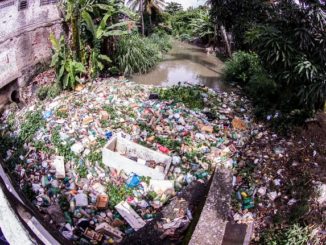
Sun 27 May 2018 00.59 EDT
The EU is to ban plastic straws, stirrers, cutlery, cotton buds and balloon sticks in a bid to tackle the rising tide of plastic waste, a move that has prompted urgent calls for the environment secretary, Michael Gove, to guarantee that the UK will follow Brussels’ lead after Brexit.
The restrictions on “single-use” plastic will be launched on Monday by the European commission as part of its plan to ensure that 55% of all plastic is recycled by 2030. About 80-85% of all litter in the oceans is plastic, and half of that is made up of throw-away items such as plastic straws.
A leaked draft of the commission’s proposals spells out a step-change in the bloc’s attitude to plastic waste. But it is likely to come too late to be part of the bulk of EU legislation due to be transposed into UK law.
The draft document, to be unveiled by commission vice-president Frans Timmermans, states: “Single-use plastic products for which suitable and more sustainable alternatives are readily available should no longer be placed on the union market to limit their impact on the environment.”
The plastic items targeted by the ban are cotton buds (except for swabs for medical purposes), forks, knives, spoons, chopsticks, plates, straws, beverage stirrers and sticks for balloons. Where there are no readily available alternatives, such as plastic fast-food containers, the EU says member states must respect a “polluter pays” principle. Companies making such items will have to cover the costs of waste management and the clean-up of marine waste, along with measures to raise awareness to prevent and reduce such litter.
Quick guide
Plastics and our throwaway society

Since the 1950s, 8.3bn tonnes of plastic has been produced. Plastic is seen as a versatile, indispensable product, but the environmental impact is becoming more stark. Plastic is now so pervasive that recycling systems cannot keep up and the leakage into the environment is such that by 2050 plastic in the ocean will outweigh fish. Last year scientists found plastic fibres in tap water, and plastic has been found in the stomachs of sea creatures in the deepest part of the ocean. Most plastic waste ends up in landfill sites or leaks into the natural environment, where it is causing huge damage to eco-systems on land and sea, creating near permanent contamination. According to academics in the United States, by 2015, of all the plastic waste generated since the 1950s, only 9% has been recycled, with 12% incinerated and 79% accumulated in landfill sites or the environment.
Producers of plastic include retailers, drinks companies and supermarkets. The Guardian revealed that supermarkets create more than half of the plastic waste in the household stream in the UK. But they refuse to reveal how much they put on to the streets and how much they pay towards recycling it. Supermarkets are under pressure to reduce their plastic packaging and campaigners argue they have the power to turn off the tap. Much of the packaging they sell to consumers is not recyclable: plastic film, black plastic trays, sleeves on drinks bottles and some coloured plastic. The Recycling Association and other experts believe supermarkets could do much more to make packaging 100% recyclable and reduce the use of plastic.
The taxpayer, overwhelmingly. Producers and retailers pay the lowest towards recycling and dealing with their waste in Europe. In other countries, the “polluter” is forced to pay much more. In France, a sliding system of charges means those who put more non- recyclable material on the market pay more.
Supermarkets are under pressure, not least from the prime minister, to create plastic-free aisles. A growing number of zero-waste shops are springing up and consumers are being encouraged to ask for products to be sold without plastic.
Sandra Laville
EU countries will also have to achieve a significant reduction in the use of such containers and throw-away cups within six years of the proposal being written into national law. The EU would like member states to use deposit schemes to ensure that 90% of plastic bottles are collected separately by 2025.
Caroline Lucas MP, co-leader of the Green party, has called on Gove to meet the EU’s standards on plastic waste after Brexit. Gove had a public Twitter spat with Timmermans earlier this year after claiming that EU legislation might get in the way of a UK ban on plastic straws.

Lucas told the Observer: “Once again the EU is way ahead of the UK when it comes to the pace and direction of protecting our environment. We all know that single-use plastic needs to be eradicated but all we’ve got from this government is a vague promise of action on ‘unavoidable’ waste by the end of 2042.
“If Brexit goes ahead, we need clarity and certainty that our environment will not be sold down the river and that means a watchdog with real teeth. That’s how to help ensure Britain outside of the EU doesn’t slide back into its old reputation as the dirty man of Europe.”
ClientEarth chemicals lawyer Alice Bernard said: “These measures are essential to stop our wasteful use of plastics and an important first step to tackle plastic pollution. We hope the next steps will be addressing the issue of dangerous chemicals in plastics – such as bisphenols.”
Last week the United Nations warned that Britain’s reputation was at risk over plans for a new post-Brexit environmental watchdog which would not have the power to take the government to court. Despite Gove’s promise of a “green Brexit”, the Treasury is said to have resisted giving the new watchdog the same powers as the European commission because of the potential impact on post-Brexit growth.
Earlier this month the UK and five other nations were referred to the European court of justice for failing to tackle illegal levels of air pollution. The ECJ has the power to impose large fines.
Bas Eickhout, the Dutch Green MEP, said: “Whether the deal will be concluded before or after Brexit remains to be seen. But given the urgency of tackling our plastic waste problem, I expect the UK to implement this policy anyway. Theresa May already showed she is happy to implement EU plastic policies when she proudly presented her policies against single-use plastic bags, so I expect she won’t do any less on all single-use plastic policies.”
The EU first outlined its intention to ban straws as part of a wider strategy in January ahead of the publication of draft legislation expected on Monday. In April, Gove announced a consultation, rather than draft legislation, adding that he was unsure of the legal basis of such a ban.
A government spokesman said, however, that they believed the UK was leading the way. He said: “The UK set an example with our proposals earlier this year to ban plastic straws, cotton buds and stirrers and it’s good to see the EU following our lead.“While we want to see a reduction much more quickly than the 6 years proposed for some products and want to see other European nations follow our ban on plastic micro-beads, any action to reduce plastic waste is of course welcome.“As we deliver a Green Brexit, the UK will continue to show global leadership in setting even higher environmental standards.”
Source: https://www.theguardian.com/environment/2018/may/27/britain-follow-european-ban-single-use-plastic
Visits: 25




Be the first to comment